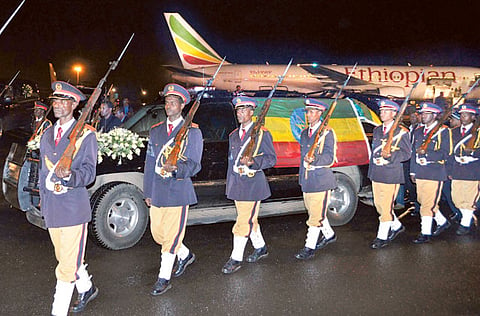Ethiopian late leader Meles’s body arrives in Addis Ababa
Death of strongman offers chance to end crackdown on basic freedoms, rights groups say

Addis Ababa: Thousands of mourning Ethiopians turned out Wednesday as Ethiopian Prime Minister Meles Zenawi’s body arrived at Addis Ababa airport following his death in a Brussels hospital at the age of 57.
A military band played as the coffin, draped in an Ethiopian flag, was taken from the Ethiopian Airlines flight in the early hours of the morning, a ceremony also attended by political, military and religious leaders as well as diplomats.
Deputy Prime Minister Hailemariam Desalegn, 47, who has also been foreign minister since 2010, will take over interim power, government spokesman Bereket Simon said.
Meles died overnight Tuesday following a long illness. He had not been seen in public since the G20 summit in Mexico in June.
His wife, Azeb Mesfin, was seen leaving the plane dressed in black.
The coffin was taken to the prime minister’s official residence at the national palace, where Meles’s body will lie in state until the funeral, said national television, which broadcast live footage from Addis Ababa streets as the coffin passed slowly.
Ethiopia has declared a state of national mourning, but no date for the funeral has been set.
Bereket said “everything is stable” in the country.
Meles, a regional strongman in the volatile Horn of Africa, was a former rebel who ruled with an iron fist for more than two decades.
He came to power in 1991 after toppling the brutal dictatorship of Mengistu Haile Mariam, set Ethiopia on a path of rapid growth and played a key role in mediating regional conflicts, but also drew criticism for cracking down on opponents and curtailing human rights.
US President Barack Obama led tributes to Meles, who he said deserved “recognition for his lifelong contribution to Ethiopia’s development”, while UN Secretary General Ban Ki-moon hailed Meles’s “exceptional leadership”.
Meles was a key Western ally in a region home to Al Qaida-linked groups.
But while world leaders praised his legacy, rights groups said his death offered a chance to end a brutal crackdown on basic freedoms.
Meles was regularly singled out as one of the continent’s worst human rights predators, and Amnesty International called on the country’s new leaders to end his government’s “ever-increasing repression”.
Human Rights Watch called for the next administration to repeal a much-criticised 2009 anti-terrorism law, under which several opposition figures and journalists, including two Swedes, have been jailed for lengthy terms.
Diplomats and analysts in Addis Ababa say it is unclear how the government has been run since Meles was reported to have been hospitalised in June.
Ethiopia faces several internal threats, including the rebel Ogaden National Liberation Front, fighting for greater autonomy in the southeastern ethnic Somali region. The group said it hoped Meles’s death “may usher [in] a new era of stability and peace”.
Meles — who also had strong trade links with China — was credited with Ethiopia’s economic boom in the past decade, with growth shooting from 3.8 per cent in the 1990s to 10 per cent in 2010.
His death also leaves a major power gap in the Horn of Africa, with Ethiopia playing a key role in the fortunes of many of its neighbours.
Ethiopian troops invaded Somalia for a second time last year — after a US-backed invasion in 2006 - and Ethiopia is supporting the fight against Somalia’s Al Qaida-linked Shebab insurgents.
The Shebab said it was celebrating the “uplifting news”.
Meles’s death could also potentially see changes in the relationship with arch-foe Eritrea, which split from Ethiopia in 1993 before the two spiralled into a bitter 1998-2000 border war in which tens of thousands died.
Asmara has so far made no comment on his death.
Meles also played a key role in brokering peace efforts between newly independent South Sudan and its former civil war foe Sudan.
Sign up for the Daily Briefing
Get the latest news and updates straight to your inbox


![Rachel Bloor kept her cool while guiding the snake out of the house. [Illustrative image]](http://media.assettype.com/gulfnews%2F2026-01-16%2Fmi5wlmq0%2Fpython.jpg?w=320&auto=format%2Ccompress&fit=max)
